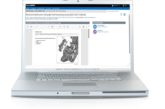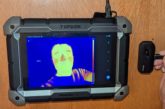In the rapidly-evolving world of diagnostics, independent garages face an escalating battle to keep up with the dealerships when it comes to technical knowledge, service levels, and reputation. Jeremy Fry, CEO at Autologic, tells PMM what needs to be done if the independent aftermarket is to avoid being left behind.
AUTOLOGICAutologic Diagnostics is a company at the forefront of aftermarket diagnostics. From its Assist centres in the United States, United Kingdom, Australia and Germany, the company provide a comprehensive diagnostics solution, built from the ground up, to deal with the challenges of today’s more complex European vehicles. Autologic Assist is believed to be the industry’s first fully-integrated diagnosis support system combining dealer-trained technician expertise with state-of- the-art technology and access to online databases of third party vehicle information via the companion AssistPlus device.
PMM: How do you see the current landscape in the automotive aftermarket?
Jeremy Fry (JF): Technology, in all walks of life, is moving forward and advancing the way we do day-to-day things. Driving a vehicle is no exception, and what we’ve seen in the last few years is vehicles coming onto the market which are fitted with sensors, cameras and all manner of complicated electrical systems that simply weren’t there a few years ago. Now, a modern BMW has a billion lines of code in it – it’s essentially a computer on wheels.
For those involved in the aftermarket, we have to look at this trend and start thinking about how quickly we can adapt to this new technology. Take a look at the day-to-day job of the modern mechanic in the aftermarket and the challenge is simple: how do you go about fixing these modern vehicles? In years gone by, the standard issues were straightforward: oil changes, adjusting brake calipers or changing brake pads, but times have changed. With the relatively basic level of training that most technicians have under their belt, they are not equipped to be dealing with this new breed of car. As more and more of these vehicles go past their warranty period and begin flooding the aftermarket, are garages ready for them?
PMM: How can Autologic help?
JF: This new level of technology is mind- blowing, so what we’re trying to do at Autologic is simplify it. In the past, we’ve enjoyed enormous success with our Blue Box product. In the era before VMs decided that they were going to open up and allow pass-through of information, mechanics needed organisations, such as Autologic, as a source of this information. What we’ve recognised, however, is that the industry has moved on, so we, like any business, need to adapt or die.
To this end, in 2015 we launched Assist, a cloud-based system that is aimed at a generalist market. What was the reasoning behind a shift to cloud-based technology? We spend an awful lot of money on licences, and there are a lot of clone products out there in the aftermarket. It upsets us that certain companies are able to gain a competitive edge by cloning other manufacturers’ products – because they’re not investing their money in product development like we are, they can afford to invest more heavily in marketing. By shifting everything into the cloud, it has made it nigh on impossible to copy us.
PMM: Tell us a bit more about your cloud-based technology.
JF: At Autologic, we feel that our cloud- based system has huge growth potential. We are able to ensure that a technician has access to meaningful information that is accurate and up-to-date, enabling them to fix a car with confidence and efficiency. As long as we know the serial number of the vehicle in question, we can run tests and provide assistance, from anywhere in the world. The reality is that the next iteration of this product probably won’t even need a box at all. We’ve seen 2,500 users take up our mobile app really quickly and we will be rolling that service out to the masses in due course.
PMM: Does this mean there’s a big launch planned for 2017?
JF: Without giving away too much at this stage, Autologic will be launching a fully cloud-based technology in 2017. In order to access this technology, all that a mechanic will need is an internet-connected device.
We’re aware of what a tough market it is out there for garages. It can be incredibly expensive for most workshops to actually afford the various subscriptions that are required in order to have access to modern vehicle information. As the complexity of a job goes up, the garage’s expense goes up, but the end consumer is rarely willing to foot the bill for this additional expenditure on diagnostic guidance.
This is where Autologic can help, in delivering a more cost-effective aftermarket solution for vehicle repairers. Ultimately, if you can fix a vehicle, with a high degree of certainty that it’s been done correctly, using the correct parts, and you’re actually able to present this information to the customer, you are far more likely to retain their business and they are far more likely to pay additional costs for diagnostic work.
PMM: How can independent garages keep up with the dealer networks?
JF: If you said to most young people, ‘what’s your perception of your local garage?’, the answer is that they’re terrified. They’re terrified to take their vehicle in because they don’t know whether they’re going to be ripped off, and that’s one of the big disadvantages that the independent sector has to deal with. Whilst the dealer network is expensive, the perception is that you’ll get your car fixed.
On this point, the aftermarket needs to help itself to be a little bit more transparent. Ideally, you want to be able to put a handheld device in front of the customer, pinpoint the problems visibly for them and ask if they are happy for you to go ahead and fix those issues. In doing so, you have built the customer’s confidence and trust in you, because you’ve been able to demonstrate to them exactly what needs to be done to fix their vehicle, what parts they need, and roughly how much it’s going to cost them. That’s where the aftermarket is struggling.
What we’re trying to do, to help the aftermarket, is enable our service to be more widely used by more garages.
PMM: What are the challenges facing manufacturers of diagnostic equipment in this evolving sector?
JF: A big challenge that all manufacturers face is the proliferation of clone products in the market. Who’s tested them? What information are they using? Is it up-to-date? If there’s an issue with a genuine piece of equipment, which has subsequently been updated and improved by the original manufacturer, when will it be fixed in the clone, if at all?
Whilst the many clone products out there might be cheaper, the risk of using them is simply not worth the cost savings – we’re talking about the safety and lives of road users here. This is something that workshop managers need to reflect in their own behaviour, by saying no to cheap, ‘knock-off’ products. Indeed, the independent aftermarket doesn’t have the best reputation for using the highest quality parts, and this issue must be addressed, or the consequences could be dire.
With the advent of connected cars, the VMs are implementing greater regulation on how the aftermarket accesses the software on vehicles. What I can genuinely see happening, if the aftermarket continues with this cavalier attitude to clone parts, is governments and legislators viewing the independent sector as a cyber security risk, ultimately leading to more and more vehicles going to go through the dealerships. As an industry, we owe it to ourselves to better regulate and better prepare.

